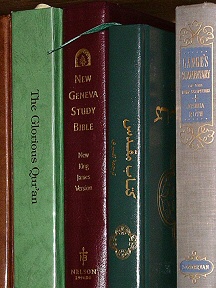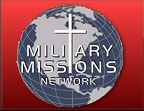The time has come to talk about holy-book burning and ask, “Why the double standard for the Bible and Qur’an?”
 The Bible and the Qur’an are not equivalent books. Treating them as if they were facilitates misunderstanding and conflict.
The Bible and the Qur’an are not equivalent books. Treating them as if they were facilitates misunderstanding and conflict.
When a pastor in Florida threatened to commemorate 9-11 by burning Qur’ans, it escalated into an international crisis (Guardian story). When the US military burned Bibles in Afghanistan, it actually defused an international crisis (CNN story).
Burning a Qur’an is exponentially more explosive than burning a Bible. It is potentially much more perilous than publishing pictures of Muhammad. In Indonesia, I saw a man die in a hospital from a beating after he’d been arrested for allegedly burning some verses of the Qur’an.
In Muslim theology, the Qur’an is a verbatim incarnation of God’s word. It is an extension of divine essence, a part of heaven. In Christian theology, Jesus fulfills that role. To Christians, the Bible is not an extension of God’s essence. It frequently quotes God in recording the history of some of God’s actions and interactions with his creation. Christians believe that Jesus is divine, and that the Bible is divinely provided and protected as a testimony to him. Muslims believe that the Qur’an is divine, and that Muhammad is divinely provided and protected as the testimony to it.
As a result, in Muslim theology, burning a Qur’an is like crucifying Christ or desecrating the Eucharist. In Christian theology, burning the Bible is like burning a very valuable and special book. Functionally, for their respective groups, the Bible and the Qur’an are different, so the responses of the respective groups are different as well.
The Muslim equivalent to the Christian Bible is their Hadith. The Hadith is the written record of the sayings and actions of Muhammad. Muslims use it to interpret and apply the Qur’an the way that Christians use the Bible to understand and apply the teachings of Jesus. Without the Hadith, there can be no authoritative application of the Qur’an. Without the Bible, there can be no authoritative knowledge of Christ.
Islam is political as well as religious. Muslims do not study the Qur’an devotionally the way that Christians study the Bible. Rather, they dissect the Qur’an legally the way that Americans treat the U.S. Constitution. A Muslim cleric is more of a legal scholar than a theological one. Muslim people leave interpreting the Qur’an to trained clerics the way that Americans leave interpreting the Constitution to trained lawyers. Muslims and Americans memorize portions of the Qur’an and Constitution. Some may memorize the whole thing. Memorizing the Qur’an or Constitution does not make one a constitutional or Muslim scholar.
Political institutions always have access to instruments of violence for defending sovereignty and policing law and order. Americans with little knowledge of the Constitution will die to defend it and protect the institutions that interpret and apply it. Similarly, Muslims sacrifice their lives to defend the Qur’an and protect the religion and institutions that spring from it. Americans have a death penalty for treason (and other crimes like murder). Muslims have a death penalty for people who leave Islam (and other crimes like adultery).
Ideally, Christians will die rather than renounce their faith in Jesus. Unlike what springs from the Constitution and the Qur’an, Jesus’ “kingdom” is not of this world. If it were, as Jesus told Pilate before his crucifixion, then his followers would have risen up to fight. Whenever people, like the Crusaders, have risen up to fight in the name of Jesus, they destroy the other-worldly nature of Jesus’ kingdom and violate the teaching of Christ. When Muslims threaten to behave violently to stop the burning of the Qur’an, they underscore the worldly nature of their kingdom and validate the comparison between burning a Qur’an and crucifying Christ.
Islam is a worldly kingdom, historically advanced and defended by Muslim political institutions. Today, the worldly kingdom of Islam is divided between many disunited countries under the dominance of a non-Muslim world system. Without a united institution to advance and defend their religion, Muslims are left all on their own to enact and threaten civil unrest when their “kingdom” is threatened.
And that, dear friends, explains why you can burn a Bible, but you can’t burn a Qur’an.







 Act Beyond
Act Beyond http://www.faithandwar.org
http://www.faithandwar.org Mark Durie's Blog
Mark Durie's Blog Military Missions Network
Military Missions Network The Christian Fighter Pilot
The Christian Fighter Pilot The Navy Christian
The Navy Christian
Well done, Bruce!
Warren Larson
Quite a unique perspective. Very insightful, Bruce!
Well said, and states why Americans need to be wary of Islam. Thanks for the clarity of explanation of beliefs and our differences.
Thanks Bruce. You nailed it. Sadly, the typical American, and yes the typical Christian, too, doesn’t have a clue of these significant differences.
Excellent article – though I’m still no fan of burning Bibles 😉 You made some good parallels – very helpful with understanding. Thanks for your work!
Bruce,
I am in a class with some military officers from the Middle East. Two of them recently compared the Qur’an to the US Constitution, especially when discussing Sharia law. I think what they have said in class is in line with what you wrote. It’s hard to find perfect analogies, but these thoughts help.
There are some other cultural differences at play here. I have a pocket Bible that is dirty and raggedy- has been in my pocket through Ranger School, field exercises, etc. I also think nothing of setting my Bible on the ground underneath my chair while singing or praying in church. My understanding is that Muslims don’t set their Qur’ans on the ground. They are kept clean and on a shelf. Nothing is stacked on top of it.
Jason
Bruce,
You should read Shariah the threat at http://www.centerforsecuritypolicy.org/upload/wysiwyg/article%20pdfs/Shariah%20-%20The%20Threat%20to%20America%20(Team%20B%20Report)%20Web%20Version%2009302010.pdf. I just finished it it an it was very enlightening – maybe a little scary. Tx Dwight.
One again, Chaplain B schools us all on a VERY critical area of understanding Islam and COIN. Our BCT was accused of merely tearing a page of a displayed Qoran in Baghdad in 2003 and an entire district seemed ready to throw themselves into our perimeter to demonstrate their outrage. Oh! How many lives might have been saved had we had chaplains like CH B doing their job and analyzing religion as it affects battle and advising our commanders!
Great work, Bruce. I passed your newsletter on to some friends – one military heading to Afgh in about six weeks, and to two friends engaged in ministry in the M world.